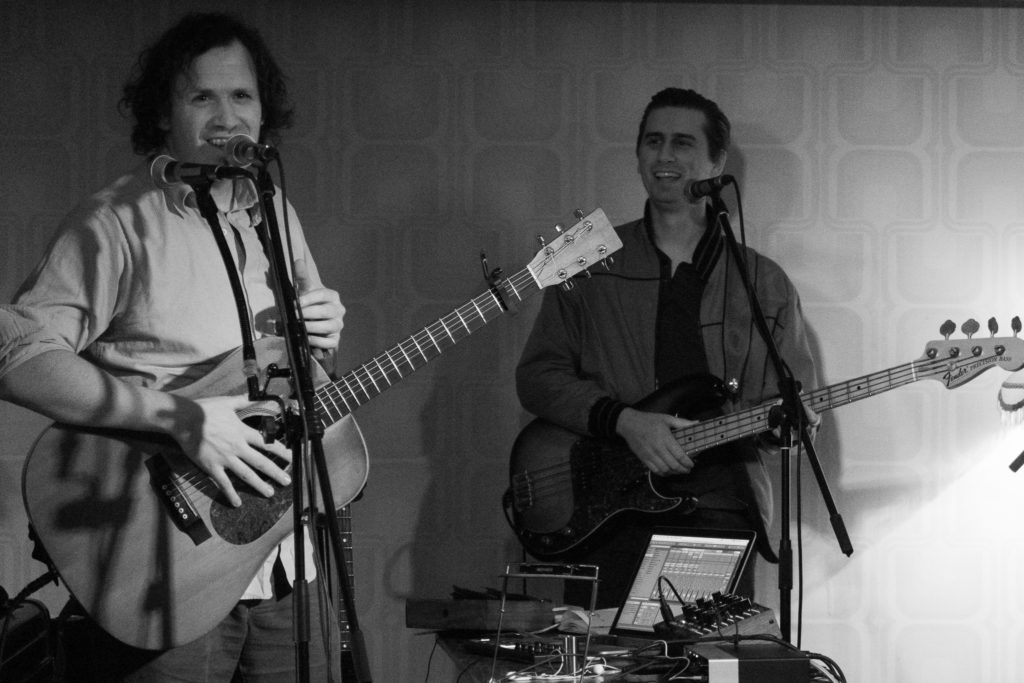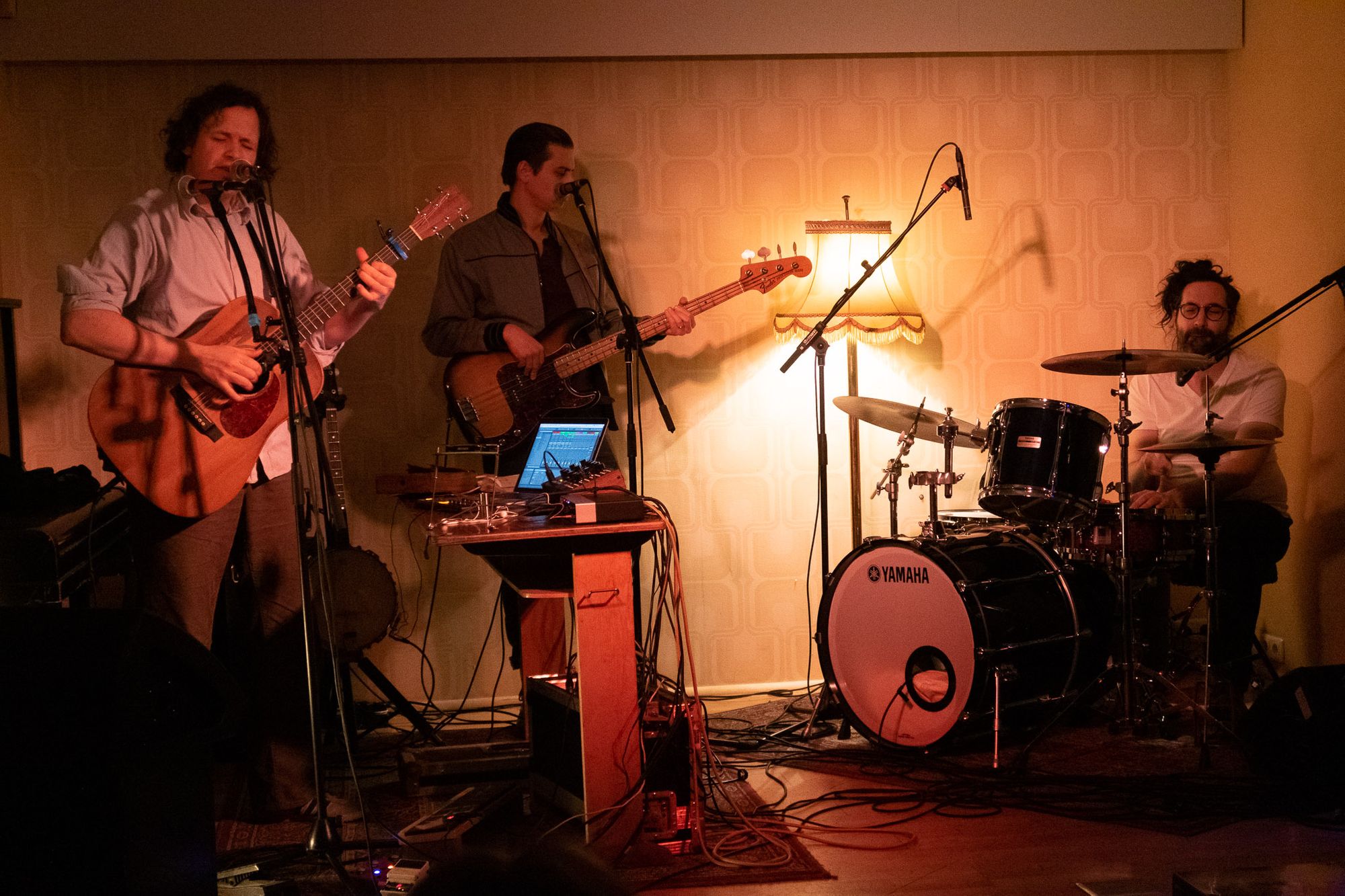Seamus Fogarty is on a massive tour in mainland Europe, so he says himself. Following the release of his EP The Old Suit (Domino), he will be visiting further destinations, see here. Offbeat took the opportunity to visit a gig in Cologne, Germany, at the lovely venue Die Wohngemeinschaft on February, 4th 2019 and had the chance to speak to Seamus Fogarty before the concert.
Folktronica, that’s what Seamus Fogarty does, if you believe the hype. Yes, he comes from a traditional music background and he loves fiddling about with synths, but to reduce his songs to these two influences would be unfair. In front of us tonight stands a performer who offers a sheer endless variety of musical styles, is well-crafted after years of live performances, tells a good story and, well, does much more than I expected him to.
I did not expect Seamus Fogarty to play songs from his whole oeuvre, to have such a tight rhythm section (Aram on drums and Johnny on bass) with him who even do a well-choreographed dance (yep!), to sound like a huge band, to offer such diverse music, to be dedicated, in good spirits and courteous despite the rather meagre audience (a cold Monday night in Cologne with lots of other things going on) and to present to us Lisa O’Neill.
I barged too late into Lisa’s set (soooorrrreee, that Falafel sandwich was huge, took ages) and there she was, Lisa O’Neill, doing what Seamus does so well, but on her own and in a raw traditional style: The story-telling. Also before the musical story-telling she explained how the songs came about and there is many a very touching song and story there, social and political awareness but also very funny ideas that she talks about with a deadpan face (and that had me laughing like a drain. I would love to tell you the story about Elvis, but you will just have to go, see Lisa and hear it for yourself).
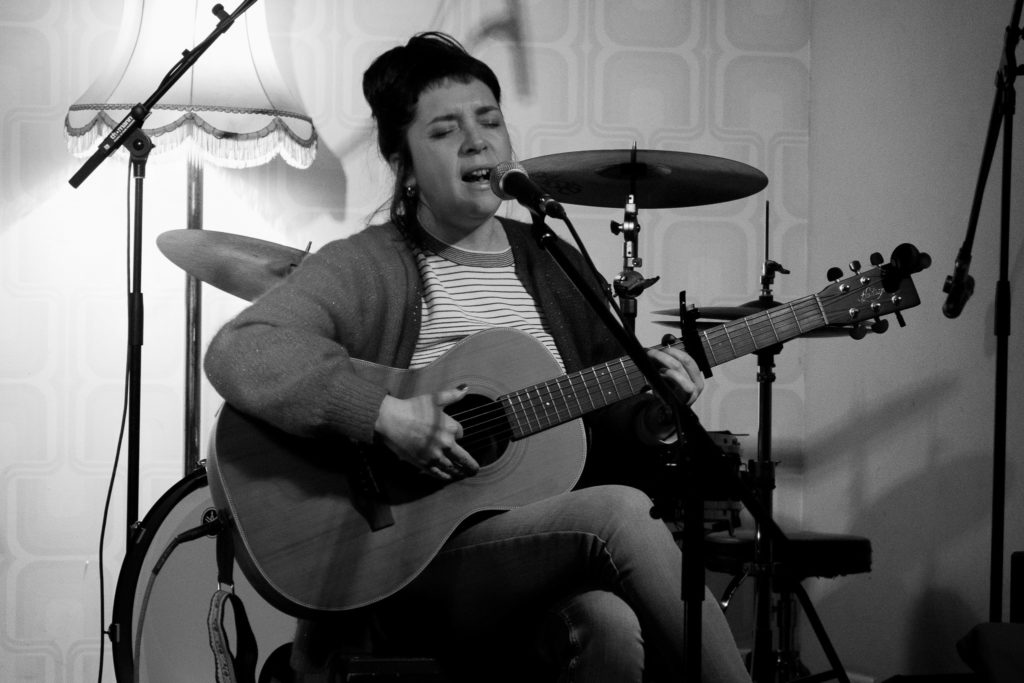 Luckily, I only had to shed tears with laughter as Seamus refrained from playing those songs that are pure heartache, thinking maybe, it might be a bit much in such an intimate surrounding. A marvellous evening was had by those attending and I hope it wasn’t so bad for Lisa, Seamus, Aram and Johnny either. You will find Seamus Fogarty’s latest releases “The Old Suit” and “The Curious Hand” on Domino Records and Lisa O’Neill’s much acclaimed album “Heard A Long Gone Song” is out on River Lea.
Luckily, I only had to shed tears with laughter as Seamus refrained from playing those songs that are pure heartache, thinking maybe, it might be a bit much in such an intimate surrounding. A marvellous evening was had by those attending and I hope it wasn’t so bad for Lisa, Seamus, Aram and Johnny either. You will find Seamus Fogarty’s latest releases “The Old Suit” and “The Curious Hand” on Domino Records and Lisa O’Neill’s much acclaimed album “Heard A Long Gone Song” is out on River Lea.
So, there you have it, I won’t be giving away any more, only this and this is a lot, an interview with Seamus Fogarty. Read it below, Seamus in his own words.
Offbeat Music Blog: Thank you very much for taking the time, Seamus!
Seamus Fogarty: My pleasure!
OMB: Please, Seamus, would you tell us something about yourself? You’re originally from Ireland and started out doing music there, I suppose?
SF: Yeah, I’m from the West of Ireland and grew up in the middle of nowhere. I started playing traditional Irish music when I was about four or five years old. I then played that for a few years and became a teenager and dropped all that and started playing the guitar. I started getting a broader taste in music, I guess, and listening to different labels like Drag City Records and Domino. I went and travelled for a while and started playing music in Irish bars, playing covers. Then I started to write my own tunes. I used to slip them into the setlist and that went on for a few years. I went back to Ireland and did all sorts of stuff, not really musical, but I kept writing and started recording my ideas and learning how to produce. I met up with the guys in Scotland, Fence Records in 2009. That’s ten years ago (whistles) and now here we are.
OMB: You went on from Fence Records to Johnny Lynch’ Lost Map Records?
SF: I did. I worked with Johnny at Fence. He’s just a really inspirational guy and when he started up this new label, I jumped at the opportunity to work with him a bit more. I am still really good friends with him and he’s really good for advice. He’s a great dude!
OMB: Have you played on his Howlin’ Fling Festival on the Isle of Eigg as well?
SF: Yeah, I have. Don’t remember it but I have a few times (laughs)!
OMB: It must be a glorious festival but a bit rough, isn’t it?
SF: It’s phenomenal! Are you going to go? I think, it’s sold out again.
OMB: The tickets were sold out like in five minutes!
SF: It is an unforgettable experience!
OMB: And you were signed by Domino, just like former Fence labelmate James Yorkston?
SF: That was amazing. Because I had been listening to the guys on that label since, you know…I remember, my brother brought home a CD from Amsterdam in maybe 2000, no maybe like 1995 1996 even, when Domino had just started as a label and I have been listening to them ever since. It was really like a kind of “pinch myself” moment when I went into the office and talked to the guys there.
OMB: You have been located in London now for quite a while but you do go back to Ireland to write, do you?
SF: I guess so. I mean, I’ll write anywhere I can but sometimes I find it is going back there and getting away from the greyness of London, even though Ireland is very grey…but it is quite green as well, so that balances it out. I think there is just a slower pace back in Ireland. It is a bit more conducive to gathering your thoughts.
OMB: You only released “The Curious Hand” late 2017 and followed that up very quickly with the EP “The Old Suit” last year. There is a special story behind that EP, would you like to tell us about that?
SF: This time last year I went back to Ireland just to give myself a bit of space and a breather. And also, I was expecting our first child, so I knew I was not going to get much of an opportunity to just take off and write songs for a while. So, I am back there and it was just after one of my friends, Willy, passed away. I was down there for two weeks on my own, in County Kerry. I thought about him a lot. That song is just about seeing him before he died but it was also celebrating him as well. It’s not meant to be really sad/sad even though it is a sad thing. But I liked the idea of…there is a lot about flight and wings and stuff. It’s not new unexplored territory but for a reason sometimes it is nice to think about people, once they are gone, that rather than being buried, their soul would lift off.
OBM: James Yorkston did something similar on his upcoming album “The Road To Harmonium”, thinking about people who have passed, events that have passed, but life goes on and they are still with you and you are celebrating the memories.
SF: Yeah, I think this is important. Because you sometimes forget or it takes a while to really appreciate the good times you had with people after they leave and sometimes it can be a really nice feeling that can warm you up when you are feeling down. To think “that was nice” and keep going.
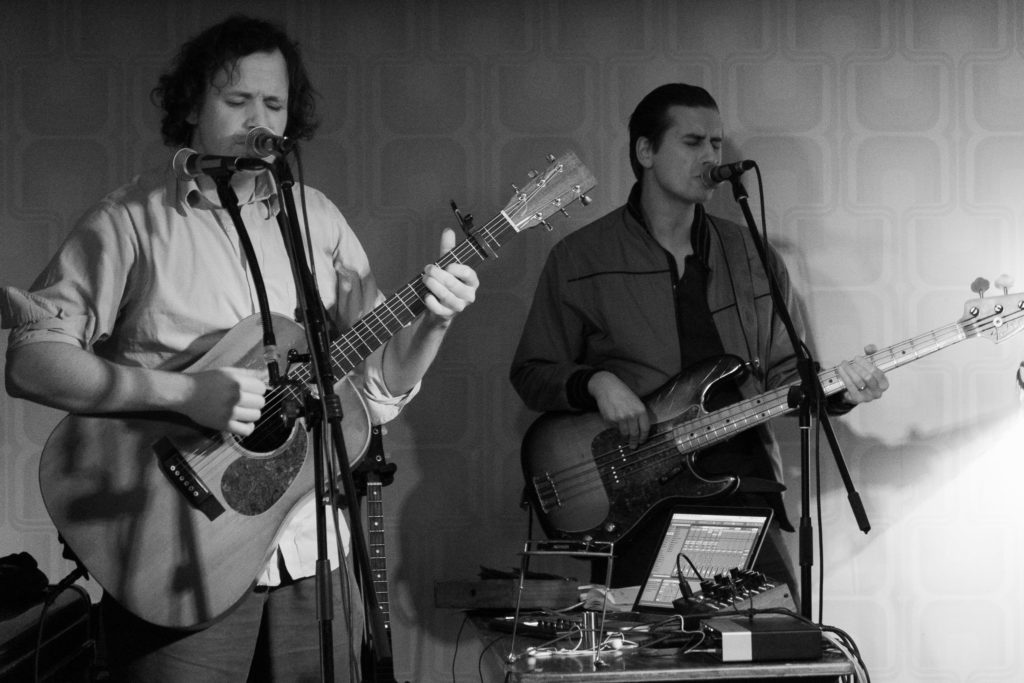 OBM: On your albums you have the cheerful songs, the funny ones and then the heartbreakingly tender ones like “Christmas On Jupiter”. They are not planned as concept albums or are they?
OBM: On your albums you have the cheerful songs, the funny ones and then the heartbreakingly tender ones like “Christmas On Jupiter”. They are not planned as concept albums or are they?
SF: Well, you know, with the last album, when I had this bunch of songs, I would think very carefully how I would sequence the songs.
OBM: Do you think about the songs as in an album since nowadays people tend to think more in individual songs for streaming.
SF: Oh I think about the sequence of songs. It should be like a journey for the listener. It is really important to me. It is like when you make a TV series. You can watch one episode and it could be really good but you really get the value out of it if you go from episode one to two, three, four, five, six..the whole thing. If people just want to watch episode five, that’s fair enough. Once it’s out there, it’s up to whoever. I don’t want them to do what I tell them. If they just want to listen to one song…that’s what it is today, people make playlists and so your song could be in a total different context to how you originally thought it would be.
OMB: It’s that and also, you wrote the songs with one thing in mind but once they are out, people make them their own.
SF: Yeah, exactly. That’s why you do it, otherwise, what’s the point in putting them out there?
OMB: You know, the music industry puts artists into genres. You are put into “folktronica”. Are you happy with that?
SF: Ach, I mean…I consider myself just a songwriter and a kind of producer. I understand why people call me – especially – folk: I use a banjo, I might tell a story, the lead vocal is important. But it really doesn’t bother me, I don’t mind what they want to label me as, as long as they buy the records and come to the gigs – they can call me Europop, it’s fine.
OMB: It’s basically the music you grew up with and that you later listened to but you also take a lot of sounds from your surroundings?
SF: Yeah, I mean, I used to listen to lots of Aphex Twin and Autechre and even John Cage and Steve Reich and these people. Especially John Cage, there was a totally different way to look at sound. It’s not even music but just sound as an art form. So when I made a mistake and thought I shouldn’t have and I can’t have that in there, I was like, you know, actually, that makes it more interesting and it is unexpected, so I just leave it in there.
OMB: It serves a purpose?
SF: Exactly, I chose to leave it in there and it has become part of the song or the composition.
OMB: Is that very difficult to bring on stage?
SF: It is pretty difficult. If you come in tonight, you can see me flapping around up there on stage. I have been making mistakes on the stage for like ten years. Especially when I use electronics, loads of things go wrong. That’s the show. There is not much in the way of backing tracks. There’s lots of live electronics. Yeah, stuff goes wrong all the time but that’s how it is. It is not a kind of perfect thing. It has grown since 2011 and slowly got a bit more…it works more often but it still goes wrong plenty of times as well.
OMB: But it’s part of the live experience.
SF: Yeah, exactly, it’s part of the live experience and I have such a good band as well. It becomes part of the show, part of the music. Sometimes the mistakes are really cool. “Dunno how I did that but that was really good!” Sometimes not so.
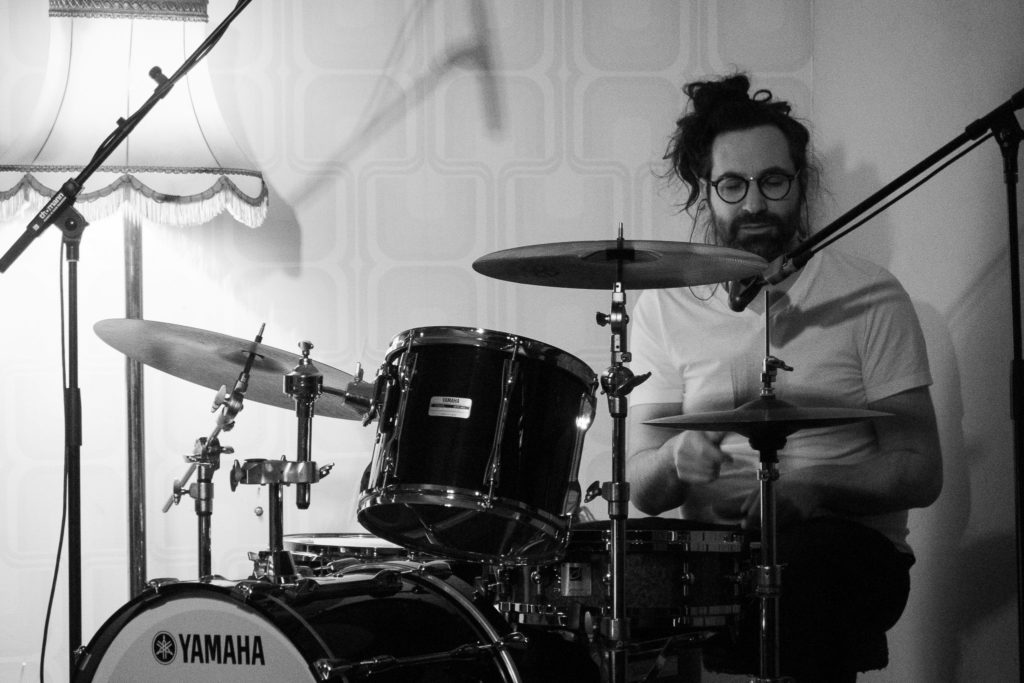 OMB: Are you with a touring band or is this the band you always play with?
OMB: Are you with a touring band or is this the band you always play with?
SF: I played with Aram, the drummer, for the last six or seven years. I’ve done a few shows with Johnny, the bass player, last year. This will be the first tour with him but I have known him for a long time.
OMB: If you introduce a musician new to the band, do you find, that they always see your music the way you see it?
SF: No, not really, but then they bring their own kind of stamp to it.
OMB: And that’s okay?
SF: Of course, else I wouldn’t have them in the band.
OMB: Part of the development of the songs?
SF: Yeah, exactly. And it becomes new. When there is a new band, it sounds different. Cannot even say whether better or worse, just different. But that’s good, it freshens it up for me.
OMB: So tonight you are playing with Lisa O’Neill?
SF: Yeah, oh, I have known Lisa for a million years. She’s brilliant. We have been playing gigs with Lisa since about 2006 or 2007 in Dublin. And I played on the album before last, “Puddle In The Sky”. She’s a great friend and a great inspiration. I think she is amazing. I think we are really lucky and delighted to have her for these shows.
OMB: You are still in a close network with the Fence colleagues like Rozi Plain and James Yorkston for instance?
SF: Yeah. They are people who I met when I just moved over to London like Rozi, she’s great. She’s played with me before and she’s on my album. James, I toured with James loads. It is like a network of people.
OMB: And you have the same kind of mindset?
SF: Yeah, you’ve gone like the same route. Yes. We all kind of support each other, crying on each other’s shoulders (laughs).
OMB: In the tough music business? How do you find it that digitalisation and the internet has given the services like bandcamp to artists who can release their music themselves if not on a label? Do you think it makes it easier for a musician?
SF: Yeah, I think so. I guess, social media plays such a big part in it which I am useless at, crap at. I am just too tired.
OMB: I was just going to ask whether you are comfortable with the the social media?
SF: The thought of it makes me fall asleep but it is such a thing nowadays. I wish I was a bit faster. You know, I sit there thinking for like a few hours, aaargh, what’s the funniest way, what’s the best caption I can put on this picture of, like, a salt cellar? And try to get people to share it. Och, it’s…But I think there is a whole new generation of musicians that are growing up promoting themselves and it is a way to get out there.
OMB: Has its downsides as well like streaming services that maybe musicians were hoping not to come out of that.
SF: Oh yeah, totally. But that’s just progress, bla bla. There will be now driverless taxis out soon and then there will be no jobs for taxi drivers. Honestly, yeah, everything just goes on. It is not necessarily better but it has been this way since the industrial revolution.
OMB: So, what’s up next? With one album out the door, you must be writing and collecting ideas already?
SF: Trying, but I have a young baby…
OMB: Congratulations!
SF: Thank you! But it does not leave much room for going off to Ireland for two weeks.
OMB: I know.
SF: But I do my best. I have about half an album’s worth, I guess. Have to knock out another five or six really good songs. So maybe in the next few months, work at that. There are a few festivals coming up as well, that’ll be good for the summer.
OMB: You were at Green Man Festival last year?
SF: That was amazing. And it was so sunny. I have been there loads and most of the time, it’s just rain.
OMB: Welsh weather…
SF: Absolutely. They are nearly worse than Ireland.
OMB: Maybe in Ireland you only get the rest of what didn’t rain down on Wales. Ah, I know, the rain is coming in from the west, so that does not work out.
If you had no time or financial pressure, what would be dreaming of doing? Say, you lie in bed and think, oh yeah, I really would love to see myself in that picture.
SF: I just would like to have a big room for six months and I would like to sit in it with a few synths and stuff and just make funny noises. That’s it. That’ll be it.
OMB: Very modest!
SF: And maybe have a chef, somebody to cook me nice meals. And see what comes out of it. That’s kind of the way the last few albums happened. Fiddling around and finding an idea. But almost stumbling on them. I am not really good at sitting down and…
OMB: Planning?
SF: Yeah. So, just a bit of time. Time. That’s all.
OMB: Can’t buy time.
SF: Indeed, yeah.
OMB: Just the synths and the sounds? You are a wizard on the banjo, too?
SF: Oh no, no.
OMB: Is that what you learned as a kid?
SF: I only found that banjo in Limerick in 2005 when moving into a house. And I had never played the banjo before but I played the violin which is a bit the same. It’s great, I love that banjo. As soon as I found it, I was like, I am keeping this banjo. It’s been with me ever since.
OMB: If you started out on the violin at such a young age, your family must be very musical.
SF: It would be musical yeah. My brother, John, plays with me a lot.
OMB: Brings us back to the start. Hope the tour goes really well for you and thank you very much.
SF: Thank you. It’s been a pleasure!
